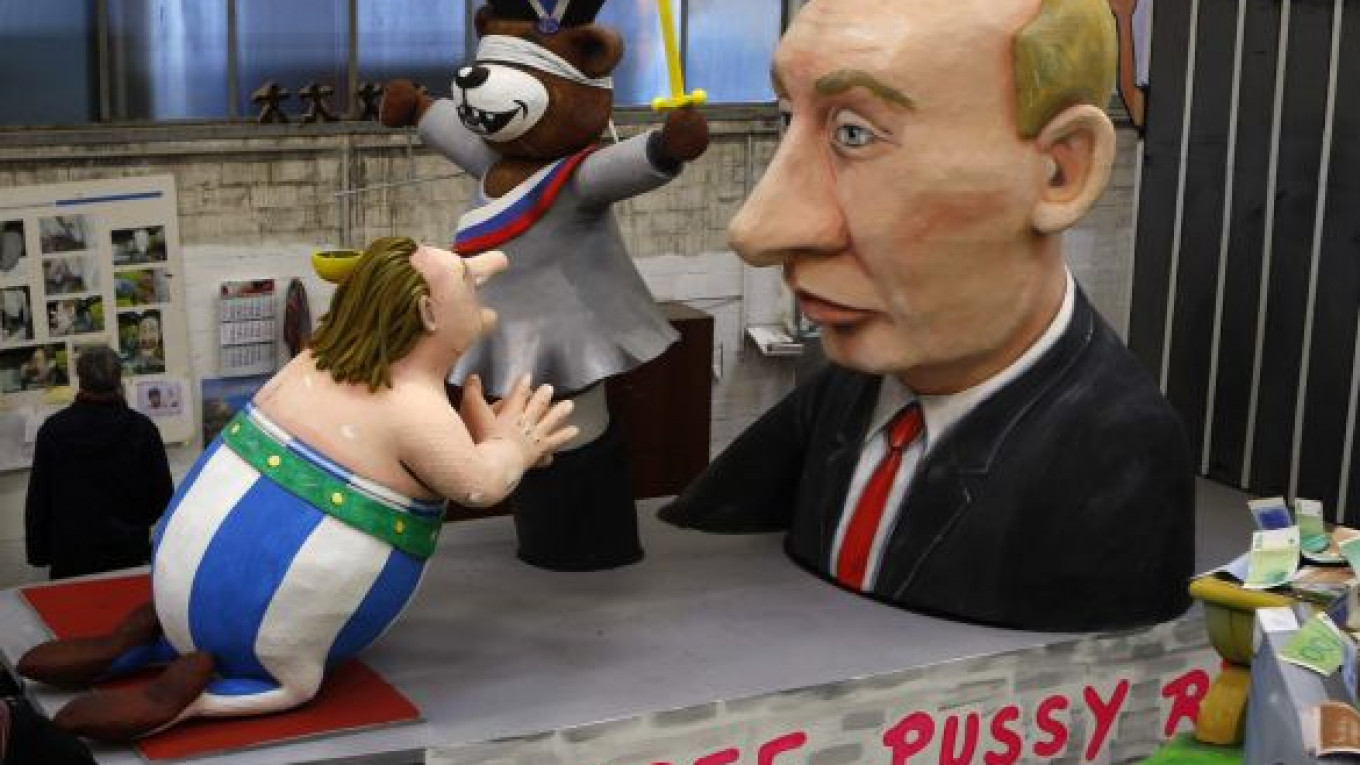Traditional family values got some interesting interpretations from Russian celebrities this week. Those who don't think plastic surgery is the highest form of marital devotion may want to reconsider their relationships.
The Russian pop scene doesn't have a shortage of strange personalities. Nikita Dzhigurda easily ranks in the top five, and this week he proved again why he deserves this prestigious title. The actor, singer and purveyor of radical mystical beliefs got plastic surgery on his face as a gift to his figure-skater wife, Marina Anissina, in time for Valentine's Day. Dzhigurda tweeted a picture of his bandaged face after the anti-aging procedure and promised fans that he will soon unveil a video shot during the operation as well.
Aging romantics who got tickets to see 1960s French icon Alain Delon in concert in St. Petersburg on Jan. 31 were disappointed to hear that the event had been moved to Apr. 13 at the last minute. Organizers cited technical difficulties as the reason for the schedule change, and some newspapers speculated that Delon had come down with a cold. The more interesting versions, however, attributed the cancellation to the bankruptcy of Ukrainian airline Aerosvit. Delon had seven Ukrainian cities on his tour and reportedly couldn't move from one to the next due to the company's financial flukes.
Bloggers continued to discuss socialite Ksenia Sobchak's surprise marriage to actor Maxim Vitorgan, which took place Friday. Perhaps to calm anyone who might have envied their newfound marital bliss, Vitorgan denied rumors that his new mother-in-law, former Senator Lyudmila Narusova, had bought an apartment in Moscow for the couple, while Sobchak insisted that she is not pregnant. One person who seemed not to care about the news was the bride's ex-boyfriend, opposition leader Ilya Yashin, who instead spent the week nonchalantly tweeting about protests and movies.?
Whenever speaking to Krasnodar officials, be careful not to mention the Kubana rock music festival. And if you do, duck. The annual event could be on the verge of being blacklisted after local authorities received incriminating videos and photos from youth organizations, including one called Sober Kuban, whose members attended last summer's concerts. The footage was apparently so shocking that some deputies proposed a permanent stoppage of what they called a "hotbed of debauchery and licentiousness." They were also discomforted by the "ideological direction" of the festival, whose past lineups included such groups as Narkotiki (Narcotics) and Tarakany (Roaches), naked performers and plenty of alcohol.
It is good to be a cultured workaholic in Moscow again. The city's culture minister, Sergei Kapkov,? said he wants to help hardworking Muscovites get into theater performances. His solution: Make the shows start one hour later. In an interview with Channel One, Kapkov said he believes that Muscovites don't go to theaters because they can't get there by 7 p.m., the time many of the shows start, and not because ticket prices are high. He is encouraging theater managers to start shows an hour later on one Friday each month, though he doesn't insist on making that mandatory. The problem with Kapkov's suggestion is that audiences will have a tough time getting back from the concerts. After all, the metro still runs until only 1 a.m.
A Message from The Moscow Times:
Dear readers,
We are facing unprecedented challenges. Russia's Prosecutor General's Office has designated The Moscow Times as an "undesirable" organization, criminalizing our work and putting our staff at risk of prosecution. This follows our earlier unjust labeling as a "foreign agent."
These actions are direct attempts to silence independent journalism in Russia. The authorities claim our work "discredits the decisions of the Russian leadership." We see things differently: we strive to provide accurate, unbiased reporting on Russia.
We, the journalists of The Moscow Times, refuse to be silenced. But to continue our work, we need your help.
Your support, no matter how small, makes a world of difference. If you can, please support us monthly starting from just $2. It's quick to set up, and every contribution makes a significant impact.
By supporting The Moscow Times, you're defending open, independent journalism in the face of repression. Thank you for standing with us.
Remind me later.


